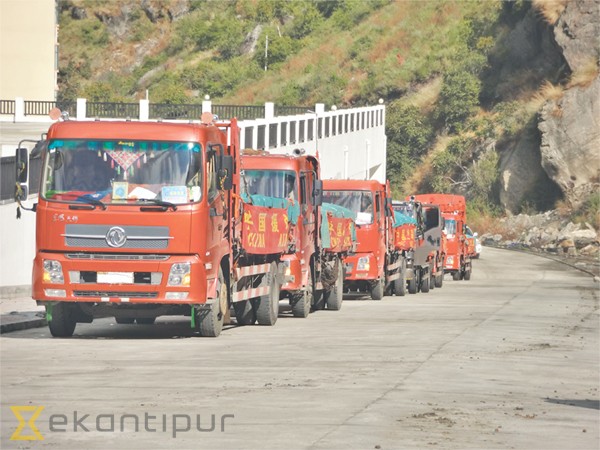Nov 9, 2015- Obstruction of supplies to Nepal for more than last 40 days at Nepal-India border points has resulted in critical shortage of life-saving drugs, affecting thousands of patients in hospitals and health facilities.
Hospital officials in Kathmandu have warned that health facilities would run out of their stocks in two weeks if situation does not improve, which could put thousands of patients at risk of suffering far-reaching health complications.
Referral hospitals including Tribhuvan University Teaching Hospital, Bir Hospital and Shahid Gangalal National Heart Centre, are fast running out of their stocks of life-saving drugs, including adrenaline and atrophin that are used for heart patients.
“If we do not get the consignments of drugs languishing at border points, our services will be critically affected,” said Dr Uttam Shrestha, Director of Manmohan Cardiothoracic Vascular and Transplant Centre.
Essential medicines for patients being treated in the Intensive Care Units are already in short supply in major hospitals in Kathmandu, while reagent stock of laboratories is depleting. Radiology units are also struggling to provide diagnostic results due to lack of films.
Dr Keyoor Gautam, Chairman of Jawalakhel-based Samyak Diagnostics, said lack of test tubes and fuel has forced them to limit their operation hours, at least by a couple of hours every day.
Officials at the Ministry of Health and Population (MoHP) said they have agreed to ferry essential drugs via air routes and are committed to ensuring smooth functioning of health services.
Dr Guna Raj Lohani, chief of Curative Division at MoHP, said the ministry is working to bring essential medicines from other countries including Thailand.
Health policy experts have said restriction in supplies is against the World Health Organisation Constitution, to which Nepal and India are signatories. The WHO Constitution identifies health as fundamental human right.
Dr Suniti Acharya, senior health policy analyst and former WHO representative to Bangladesh, said people have not been able to access health services due to acute fuel crisis. Pregnant women, new mothers and babies have been affected the most, she said.
Patients of non-communicable diseases too are bearing the brunt of acute shortage of medicines, as they need to take medicines on regular basis, and failing to do so could have serious health impacts.
“The UN agencies including the WHO and Unicef have failed in their advocacy role. They must speak up when people in Nepal are being deprived of health services,” said Dr Acharya.
Published on: The Kathmandu Post(November 9,2015)












